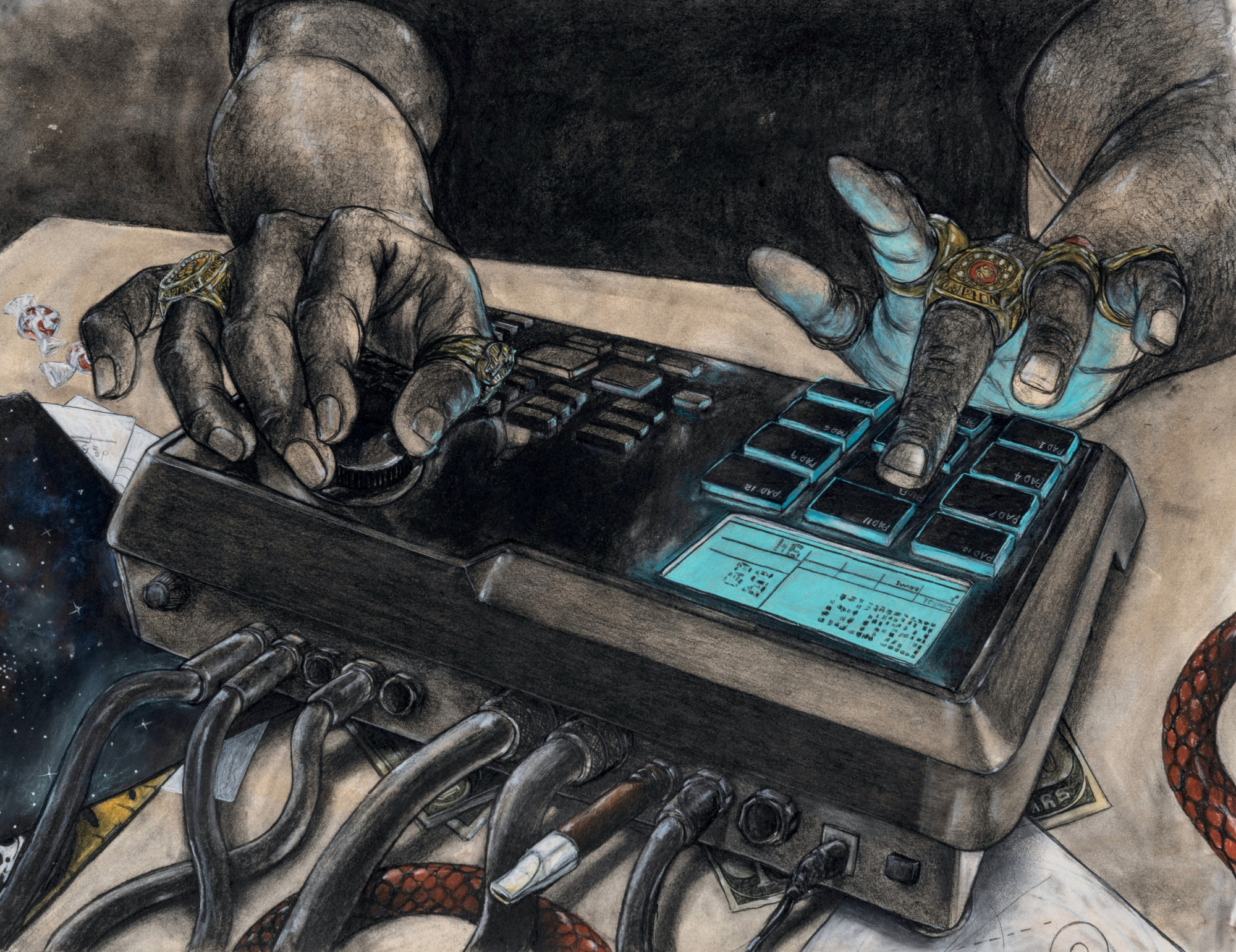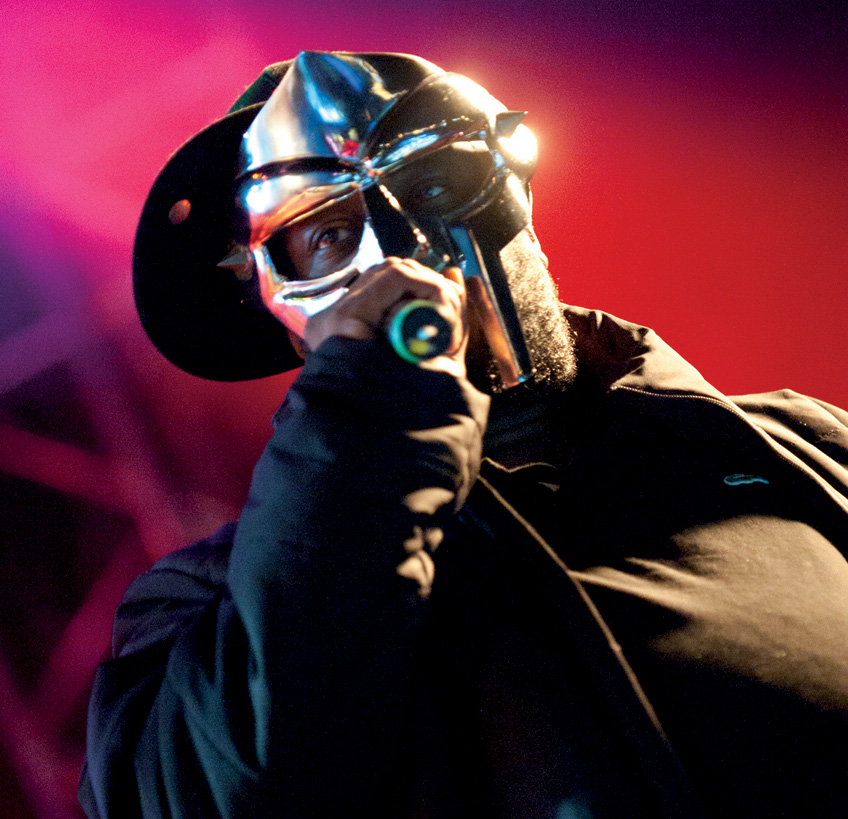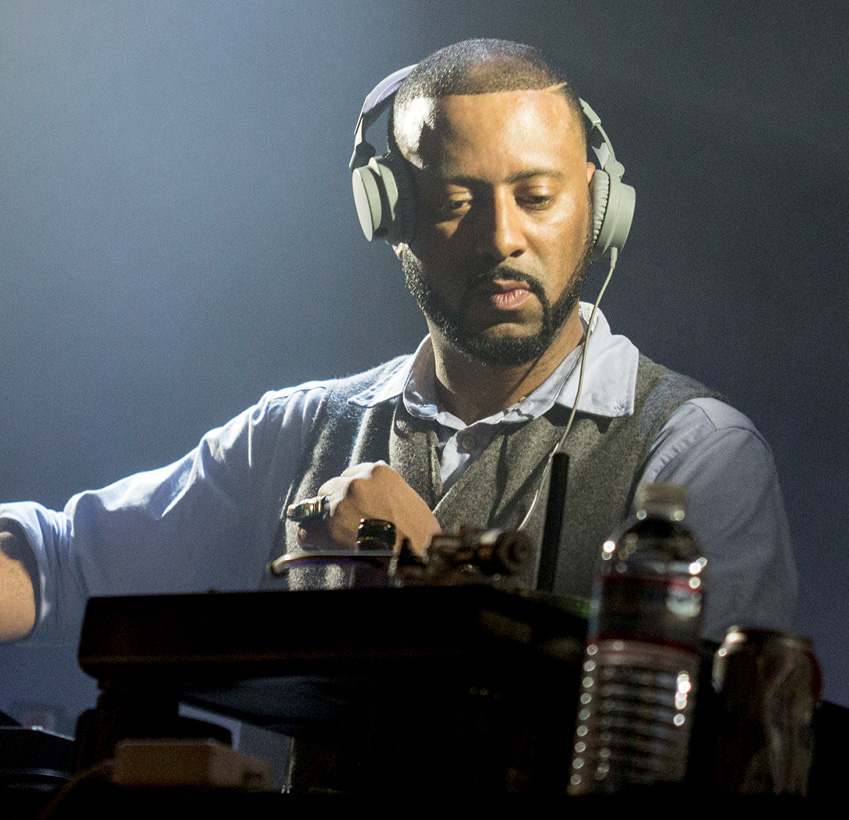
Quantum Conjuring, 2022, charcoal and Conté pastel on paper, by Robert Pruitt. Courtesy the artist and Vielmetter LosAngeles
Getting On
Madvillain's “Accordion” and the double-bind of making it
By Harmony Holiday
As a ballad rigged with allegory, “Accordion” by Madvillain courts the dread and exhilaration of getting on—a pound and a compliment at a time. Getting on as in making it, arriving, breaking in—to the industry, radio play, the club, the cypher, the studio. The alternative is the unspeakable obscurity and alienation of failed musicians. You might become a mall security guard, a devoted husband with a gambling habit, a suicide risk. No matter what, you will come to regret it if you don’t do everything in your power to become formidable, a star, one of the unfathomable ones who will always be famous. Rapper Guru once advised to never smother your heroes after a performance, just walk up like a G and offer a pound and compliment. MF DOOM adopts this nonchalant code of reverence throughout his 2004 album-long collaboration with producer Madlib, Madvillainy, and especially on “Accordion,” which unravels for just under two minutes like a dug-up psalm or lost black spiritual weighed down and levitating with winged parables, heavy and longing for the intervention of the play and mirth that color the rest of the album. There’s some lightheartedness present on “Accordion,” but its lights are austere and withdrawn. The procession of ideas throughout feels distinctly like one’s own heart center being expanded and compressed as if played like the instrument being referenced and sampled. It’s delirious, intense, a little exasperated with its own foreboding range of motion from the first line on—living on borrowed time the clock tick faster, DOOM opens, matter-of-factly despondent.
Keep your glory gold and glitter, for half, half of his niggas’ll take him out the picture, he continues later. He’s afraid of being envied; he wears his metal mask as a shield against the inevitable evil eye that comes with his facility with rhythm, language, and flow. Getting on is just as tedious as getting trapped in one’s hometown wishing, he insinuates. And it’s this way because the attention that his success brings is laced with the deviant and insincere gaze of those who think it should be them and resent every reminder of their relative mediocrity or unluckiness. “Accordion” is trying to unlock a trouble spell entrenched in the folklore of sudden empowerment through artistic celebrity. The lyrics resort to the lucid incoherence of speaking in tongues on Sunday in a small black Pentecostal church in the South, and the pace is as if driving slowly and alert through chitlin circuit backroads but almost wanting to be detected, almost wishing some sly vigilante would step in and deflect from your performed worry. Let’s be profoundly hunted if that’s how it is, demonstrate it. Having willingly taken that road proves you’re more worried about the danger of stagnancy than the threat of race violence, or praise violence, but decorum enforces caution and you act out your fears of the invisible God cameras making sure you don’t get too cavalier about fame, bookings, upward mobility. The accordion assumes a melancholic drawl and wince, the most imperceptible tremble, an ominous erotics of nowhere that becomes the metronome for Doom’s assured stride between intrigue and ennui.
This is the bleak testimony of the damned and blasphemed. It’s sanctioned by the culture of self-aggrandizement. It’s at once one of the great ballads in hip-hop and a manifesto about the insurmountable depravity of the industry. And he hold the mic and your attention like two swords, DOOM gloats explicitly, but then slip like Freudian / your first and last step to playin yourself like accordion. He’s being pursued by silent killers, he warns in a hushed scowl. He celebrates escapism, afraid he may fall on his own sword if he doesn’t. That jubilation is undermined by spectators—they’re hyper-critical of every contradiction, they threaten to cut emcees and producers whose skills they cannot best, they refuse to just surrender to the shadowy satisfaction of the music and testify over it themselves, and when they cannot hijack the charisma of their heroes, they go dark, disappear. They try to battle, and all the wounded egos come out like swords. The mic has two blades on it. For the purposes of this psychoanalysis of a reluctant ballad, let’s pretend the blades are the stark white smiles of Otis (Madlib) and Dumile (DOOM) together in the studio working on the album. They worked while both on ’shrooms, and mostly in silence. Their socializing happened at clubs, but during studio sessions they ascended into telepathic communion. Though it was O who found the sample on a Daedalus song and isolated the zombie groan of the accordion that idyllically complements DOOM’s gritty rasp, it’s like they’re each playing one side of its disintegrating sway. A kite falls in the sand when DOOM makes his grand entrance, in living, the true God. Their hearts race and swell, they hallucinate, comedown, and invent mundane settings where they’ll have to translate this nameless magic to crowds, some hostile, some so awestruck it’s invasive. You can’t think straight around fanatics.
One on one, these creative soulmates manage to retrieve and bend time for one another, they reach toward the sacred, and without traveling on the roads jazzmen traveled to small halls and jukes, they enter those spaces, imposters and then transformed to the primary heirs of jazz rigor by the will of their gallant ensemble, their imposing happenstance that becomes a blues epic unmasked by collective improvisation. The groove of “Accordion,” which the moment it drops moves you to trance, is almost too seductive in that subdued way where you don’t know what happened, but you find yourself in another time with another set of visions and desires, or fall through it like a quantum trapdoor. They must have fallen through it together like black swans pretending to be hard in public, swooping down to giggle and huddle in their secret language near the kite’s sad wing.

Photo of MF Doom courtesy Possan. Via Wikimedia Commons.

Photo of Madlib. Courtesy Carl Pocket. Via Wikimedia Commons.
Ballads come to us as if on wind patterns from the gospels of the South and move north and west with the Great Migration, with jazzmen and bluesmen crying together on dry roads with no tears and nothing sentimental but hope and borrowed time to kill before it takes them. The addictiveness of a slow mournful song is its element of revenge. Ballads allow hip-hop, a genre known for edge, to buckle with feeling and fall on its knees seeking mercy momentarily. By the end of “Accordion” DOOM is back to flippant sexual innuendo, but for its brief duration, vulnerability overrides that trope and he and his friend contemplate their own impending obsolescence as timelessness, as so what.
Now DOOM is dead and not able to rest, his legacy is plagued by controversy, the time he borrowed asks to be paid back with interest. It’s like some terrible prophecy was realized, or a pact between jazz and hip-hop to be so far ahead of the rest of culture you get bored and exit the stage to save your soul from the onset of bitterness. But we need it most right as it’s leaving, we need it to reinvent itself and refuse to go gently into the night of social capital. I’ve been at shows with Otis when he plays “Accordion” like a love note to his friend who isn’t there. I used to dismiss it as a crowd favorite, like one of his standards he just had to work into a set. Now I get how sentimental these men are, how alone together, how trapped in the future they invented and reaching for the scripture that might release them from their contract with the myth of themselves. No one wants to end up like a verse in this perfectly wrenching searchlight of a song, full of petty, inevitable danger, but everyone wants the adventurous, heartstrong, strung-out feeling it gives you when it comes on, and you look it in the eye, when you’re just about to get on stage, or on purpose, when you reach that precipice between the virtue of the dream and the curse of the nightmare and it pulls you back and forth alongside the will of its endless, senselessly aligned vibration, until you’ve become its perfect instrument and you’re playing yourself, like an accordion.



